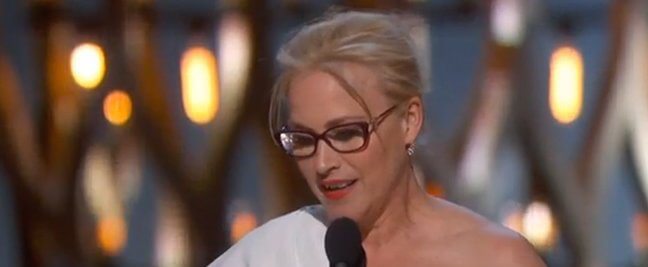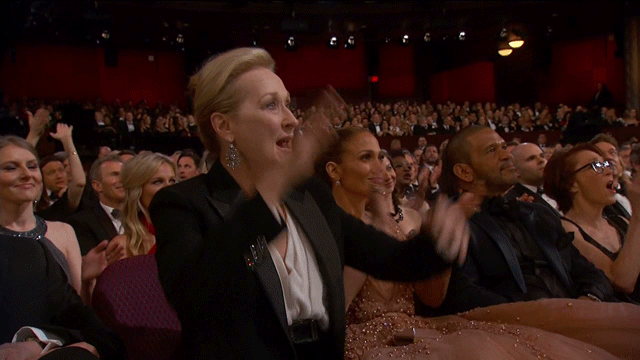

#Oscars2015
Should We Cut Patricia Arquette Some Slack?
Her backstage comments carelessly dismissed intersectionality and pissed off a lot of feminists. But there is a lot to learn from her Oscar speech—and from her gaffe.
This article was made possible because of the generous support of DAME members. We urgently need your help to keep publishing. Will you contribute just $5 a month to support our journalism?
Last night, as she accepted the Academy Award for Best Supporting Actress for her 12-year-span of acting in Boyhood, Patricia Arquette ended her speech on a rousing note, one that prompted J-Lo and Meryl Streep to shout in passionate agreement from their seats.

“To every woman who gave birth, to every taxpayer and citizen of this nation, we have fought for everybody else’s equal rights. It’s time to have wage equality once and for all. And equal rights for women in the United States of America.”
Who can’t get behind this sentiment, right? (Well, actually, lots of people can’t—Fox News shills, studio heads, etc., but I digress.) Most noticeably, it was a feminist statement that didn’t pertain only to show business. Other stars before Arquette have pleaded for more fully developed roles for women and female-centric stories but simply equal pay for equal work, no matter the industry? Unheard of.
It didn’t take long for Arquette to unwittingly chip away at the special glow she’d created for women everywhere. After the show, her comments in the press room stoked the idea that feminism is a competitive sport—with white women, women of color, and lesbians each playing for different teams.
“It’s time,” she said, “for all the women in America and all the men who love women and all the gay people and all the people of color that we’ve fought for to fight for us now.”
Today, she’s jumped in on Twitter to clarify her comments, writing, “Guess which women are the most negatively effected in wage inequality? Women of color. #Equalpay for ALL women. Women stand together in this.”
Good save, but it’s still worth parsing out the flawed logic of her post-show comments. First, her statements ignored the power of intersectionality. Not only are there lesbian women of color who’d have a hard time picking a team by sheer dint of their layered identity, but also women of all races, genders, and sexualities have reason to fight for the inequality of all people. As the poet Emma Lazarus said, “Until we are all free, we are none of us free.”
Also, what did Arquette mean when she said, “It’s time”? Is she saying that the battle for people of color and LGBT people have reached such an apex of success that they all have time to knock off and do a little work for equal rights for women?
It’s true that the public opinion on same-sex marriage has swayed recently from negative to positive in record time for such things. And the protests against police brutality toward people of color that began in Ferguson and launched the #BlackLivesMatter movement has raised more awareness but obviously, in a major understatement here, there’s still so much work to be done.
It seems clear to me that Arquette knows all of this (her sister, Alexis, is a transwoman), and in a less feverish context might’ve expressed her thoughts more articulately, and with more nuance. In a recent interview with Elle, she spoke about the discrepancy in pay for women, and mentioned specifically how it’s even worse for Black men. She also spoke of the ERA Education Project, founded by her friend and fellow actress Kamala Lopez. On the ERA Education Project website, activist Zoe Nicholson wrote about learning from the LGBT movement, and in one of their PSAs, statistics are provided about the earning discrepancies for Latinas (59 cents to the man’s dollar), Black women (68 cents), and White women (77.5 cents).
Don’t get me wrong: Arquette didn’t let her Champagne do the talking. She meant what she said and she’s not backing away from it: When will we all stop overlooking the clear inequality that plagues women’s lives? Any woman’s life, no matter her sexuality or background? How have we let inequality stand when we’re willing to march against a legal system that unfairly targets people of color, or overturn laws that don’t allow same-sex partnerships the same rights as heterosexual unions?
While Arquette’s comments may have been frustrating on some level, they can also be useful for shining a light on the most invisible members within certain marginalized groups. When we use #BlackLivesMatter, are we thinking about the rising rate of incarceration for Black women? When we’re voting for gay marriage, are we picturing the clean-cut gay wedding that’s so accepted by the mainstream that it’s an SNL sketch, or are we imagining the butch lesbian wedding that’s been deep-sixed by the collective conscious?
It’d be unfortunate to allow the potency of Arquette’s words to get discounted due to clumsy execution. Boyhood, the movie Arquette won for, isn’t a perfect specimen either. As Grisel Y. Acosta points out at Latino Rebels, for a movie set in Texas, it barely acknowledges the Latino experience and when it did, Boyhood opted for a White Savior moment, which is arguably worse than ignoring Latinos altogether. But I’d still argue that, flaws and all, it deserved its nominations, and maybe another win or two stolen from the talons of Birdman.
For better or worse, actors stump like politicians for their favorite causes. The best part of this celebrity-obsessed reality is that we have a unique kind of voting power to act on their best sentiments and discard the worst. If only we had such freedom with Congress.
Margaret Wappler is our guest columnist this week.
Before you go, we hope you’ll consider supporting DAME’s journalism.
Today, just tiny number of corporations and billionaire owners are in control the news we watch and read. That influence shapes our culture and our understanding of the world. But at DAME, we serve as a counterbalance by doing things differently. We’re reader funded, which means our only agenda is to serve our readers. No both sides, no false equivalencies, no billionaire interests. Just our mission to publish the information and reporting that help you navigate the most complex issues we face.
But to keep publishing, stay independent and paywall free for all, we urgently need more support. During our Spring Membership drive, we hope you’ll join the community helping to build a more equitable media landscape with a monthly membership of just $5.00 per month or one-time gift in any amount.




















































































